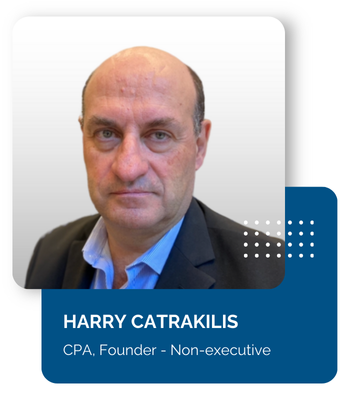Pursuing the American Dream: The Entrepreneurial Dilemma
- November 6, 2024
- Posted by: Harry Catrakilis
- Category: Blog

Merging Business Ownership with Corporate Stability: Redefining the American Dream
Harry Catrakilis ponders the question of if or when you should start your own business, as opposed to working for a company, in order to attain the ‘American Dream’. As a founder, he weighs the pros and cons, and how he’s incorporated the entrepreneurial mindset into CKH Group.
“For many, the American Dream includes the allure of owning a business, and I find myself saying as much, too. It’s a bold move, offering autonomy, the chance to build something from scratch, and the freedom to make your own decisions. Many years ago, when I formed CKH, I considered the high-performing talent in my firm and often reflected on what advice I’d give if they asked whether to strike out on their own or stay and build their career at CKH Group. Obviously, I didn’t want to lose my top performing talent, so how could my company embody the rewards of business ownership and the American Dream?
From my experience, while running your own business can be deeply rewarding, it also is fraught with challenges:
- Inertia: For new business owners, the biggest hurdle is gaining traction. You’re starting from zero, with no safety net, and a significant amount of pressure to succeed—pressure that inevitably leads to stress, especially when livelihoods are at stake.
- Isolation: The adage “it’s lonely at the top” is particularly true in entrepreneurship. There’s no built-in mentorship or peer support. You’re setting the playbook, creating policies, and making all the calls, often alone.
- Lack of Structure: Small business owners must develop infrastructure from scratch. It’s easy to understand why franchises, with their established frameworks, appeal to many, even though the cost-benefit of this path can be questionable.
On the other side, working within a company brings its own set of challenges, particularly for top talent who may feel constrained by the corporate structure. There can be limited autonomy, a lack of ownership that can lead to a sense of detachment, and usually the inability to set your vision outside of the company’s mission.
When I formed CKH, I was aware of these challenges. The CKH model was intended to bridge these gaps, combining the advantages of ownership with the stability and collaborative environment of a larger firm. Here’s how we achieved this:
- Empowerment and Accountability: Once employees reached a certain level at CKH, we empowered them with decision-making autonomy. For the right people, this was motivating and rewarding. CKH’s business units operated like small businesses under our group umbrella, each with its own profit center and bank account. Business Unit (BU) CEOs saw the direct impact of their work on financial results, similar to how entrepreneurs gauge success by the health of their balance sheets. However, this autonomy also came with accountability—a real-world taste of ownership where success is defined by results, not effort alone.
- Collegial Support: Unlike the isolation that comes with entrepreneurship, CKH provided a collaborative, collegial environment where ideas and challenges were shared. We fostered a culture where peers can discuss their thoughts and strategize together, offering a support network that entrepreneurs often lacked.
- Established Momentum: Joining CKH meant bypassing the inertia phase. Our business units already had traction, and the hard work of establishing an operational foundation was complete. This gave our team a unique advantage—you’re weren’t starting from zero but building on a foundation of success you’ve observed and contributed to over time.
Ultimately, the success of this model came down to two things: did we genuinely create an environment that mirrors the empowerment and rewards of business ownership, and were we hiring individuals who thrived under this model? I believe this can continue to be achieved by ensuring that new hires at CKH value accountability and view it as an opportunity rather than a source of stress. Perhaps, in part, societal expectations also play a role. Today, there’s a tendency for many to seek stability over the riskier route of entrepreneurship, even if it comes at the cost of true professional autonomy.
At CKH Group, as opposed to a standard corporate environment that appeals to those that desire stability, the aim was to bring together the best of both worlds: the entrepreneurial experience within a structured, supportive framework. For those who were ready to take on the challenge, it was an opportunity to enjoy the rewards of ownership without all the risks that often came with going it alone.” -Harry Catrakilis
The above article only intends to provide general information and reflection. It is not designed to provide specific advice or recommendations for any individual. It does not give personalized tax, financial, or other business and professional advice. Before taking any form of action, you should consult a financial professional who understands your particular situation. CKH Group will not be held liable for any harm/errors/claims arising from the blog. Whilst every effort has been taken to ensure the accuracy of the contents, we will not be held accountable for any changes that are beyond our control.
About the Author
Harry Catrakilis has over 30 years of experience in the practice of public accounting, corporate financial management, and investment banking. He was managing partner of CKH from 2003 until summer of 2018 when main operations were passed on to CEO Nico Meyer. This blog was written by and is the candid reflections of Harry Catrakilis.

